The ’12 Days of Christmas’ is a classic holiday song first published in its current form in 1908. In a nod to the classic carol, join The Hockey Writers as we count down the 12 Days of Hockeymas. Each day, we will provide you with a piece of hockey history as we eagerly await the start of the 2020-21 NHL season.
The year before the Edmonton Oilers entered the National Hockey League they lost the World Hockey Association’s 1978-79 Avco Cup Final to the Winnipeg Jets four games to two. They were an incomplete team in their final WHA years, not having drafted important pieces like Mark Messier and Grant Fuhr, but a young Wayne Gretzky was there, as were some other familiar names such as player-coach Glen Sather.
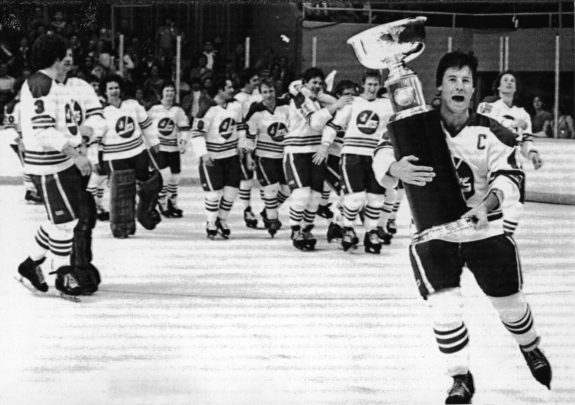
Shortly after that loss, the Oilers, along with the Jets and two other WHA teams, joined the National Hockey League, and many wondered if the team could hold up against the deep and talented opposition in the NHL. But the answer turned out to be a resounding “Yes.” Not only would Edmonton be able to compete, but they would also dominate for a decade and rewrite the record book along the way. This trip down memory lane asks a simple question: Can they do it again?
Dynasty Versus Dynasty
In 1982-83, their fourth year as an NHL team, the Oilers made it to the championship round for the first time. Opposing them were the New York Islanders, the very definition of a dynasty and a team that had won the Stanley Cup every season since Edmonton had joined the league. The two teams had met once prior, in the 1981 Stanley Cup Quarter-Final series, which the Islanders had taken in six games. This season, the Oilers dominated the playoffs on their way to the matchup, losing only a single game in the three preceding series, but the champs were about to teach them a lesson.
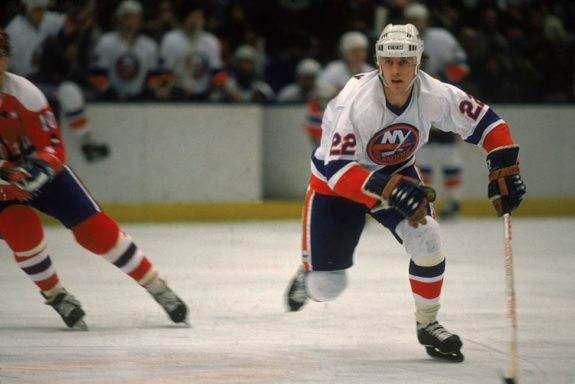
Countering the Oilers’ stars in Gretzky, Kurri and netminder Andy Moog were established NHL greats like Mike Bossy, Brian Trottier and Billy Smith. Not only were the high flying Oilers matched in skill, but they were also facing an opponent that knew exactly what it took to win. Even with most of the pieces of their dynasty team now in place, Edmonton didn’t hold the lead for a single period, losing all four games and giving the Islanders their fourth straight Stanley Cup.
The next year would be a different story. Both teams battled all the way back to the Stanley Cup Final. For the Islanders, it would be their fifth appearance in five years, rivaling the accomplishments of the greatest Montreal Canadiens teams. For Edmonton, it was to be revenge. The four-time defending champions hadn’t even lost a game in the Cup Final since two years prior.
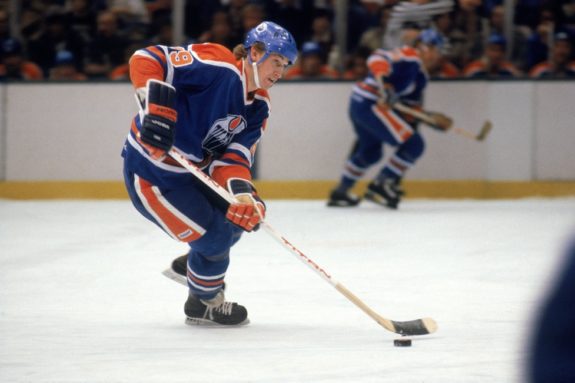
Edmonton, entering their dynastic years and no doubt remembering their bitter defeat the previous spring, held nothing back and wiped the floor with their opponent, winning the series in five games. They had dethroned the Islanders, and suddenly the Oilers were the team to beat in the NHL, but would they come close to matching the feats of the former champions? Only time would tell.
New Champs Defend Their Title
Legendary Pittsburgh Steeler “Mean” Joe Greene once said, “When you’re the champs, everybody will try to beat you.” It seems obvious, but it’s just as obviously true. Until the Oilers won their first Cup, they were just an expansion team with some talented youngsters. After they truly announced themselves with the 1983-84 victory, over the next two years, they were the ones everybody else was gunning for.
In the 1984-85 season, it would be the Philadelphia Flyers attempting to take Edmonton’s title away. The two teams could not have been built differently, with the Flyers employing a much more physical game to counter the Oilers’ offensive prowess. Their violent antics won them Game 1, but it wouldn’t be enough, as the Oilers won the next four games, winning the Cup in five just as they had a year earlier. The series was never really in doubt, as Edmonton captured its second championship in a row.
Wayne Gretzky’s team hadn’t missed a beat since their first victory, dominating the regular season and setting scoring records at the same time. If not for a single, simple play, there is a very good chance that the franchise in Edmonton would have followed the Islanders in winning Cup after Cup after Cup. But a young defenseman’s tiny error, and a goalie looking the other way, meant that Edmonton would not compete for its third straight Stanley Cup victory; however, many believe Steve Smith’s famous gaff galvanized the team over the coming years.
Back to Back Again!
A dynasty interrupted, the Oilers came into the 1986-87 season with an ax to grind. A 50 win and 106 point regular season, followed by a relatively easy journey through their divisional and conference opponents, had the Oilers battling once again for the Stanley Cup against the Philadelphia Flyers, holders of the second-best regular-season record that year. This series would turn out to be a slugfest.
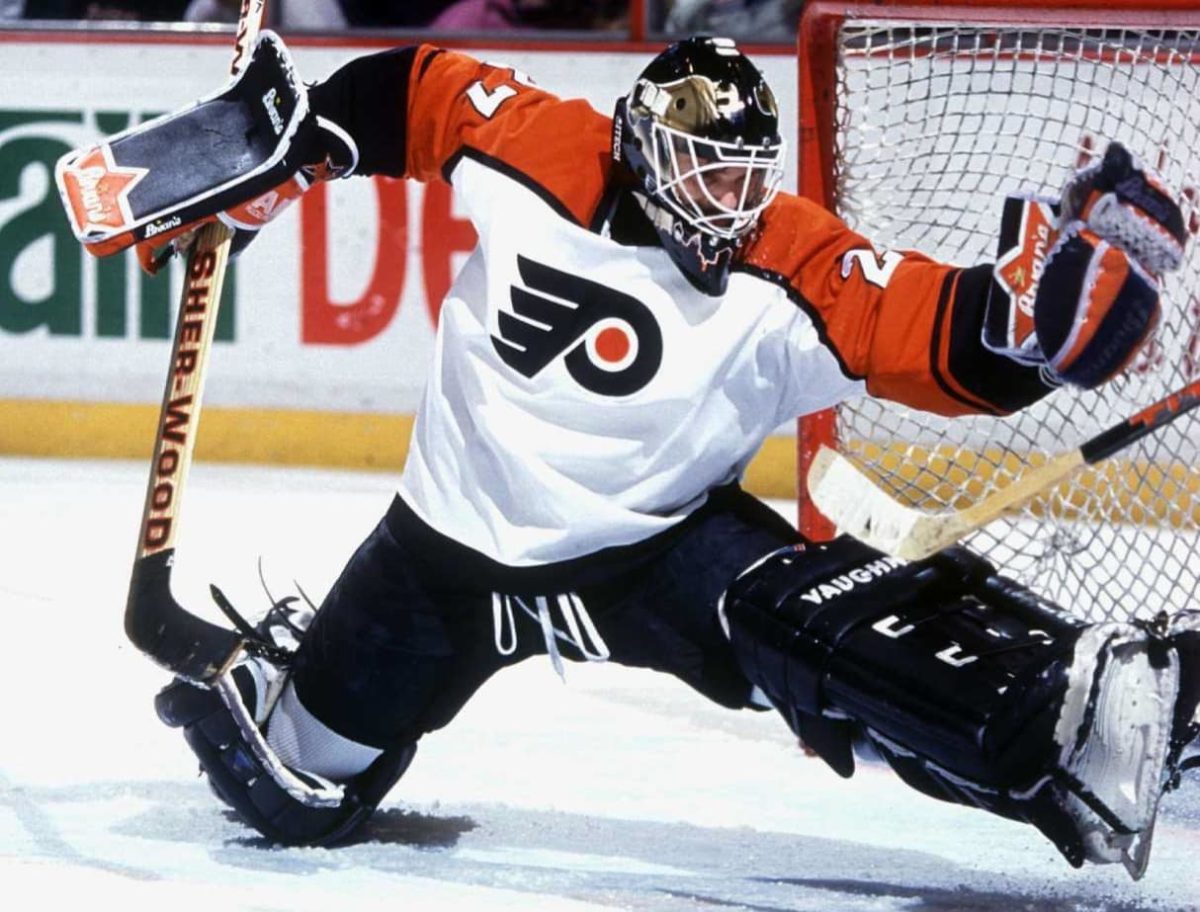
Ron Hextall, the first goalie in NHL history to score a goal by shooting the puck into the opposing team’s net, was as vicious as he was talented. Had this Flyers team played in any other era, they undoubtedly would have won multiple championships, but it was their bad luck that they rose to greatness at the same time as the best offensive team in history. Though the series was a back and forth, seven-game affair, the Oilers once again hoisted the Cup, though Hextall would win the Conn Smythe for his valiant efforts.
Fast forward another calendar year, and you have the Oilers versus the Boston Bruins. These days, the Bruins are a consistent threat to win every season, while Edmonton has struggled for relevancy despite having the best player in the game on their roster, but things were different in 1988. While players like Cam Neely and Ray Bourque were far from slouches, the Boston team that made it out of the Prince of Wales Conference found itself on the ropes almost immediately.
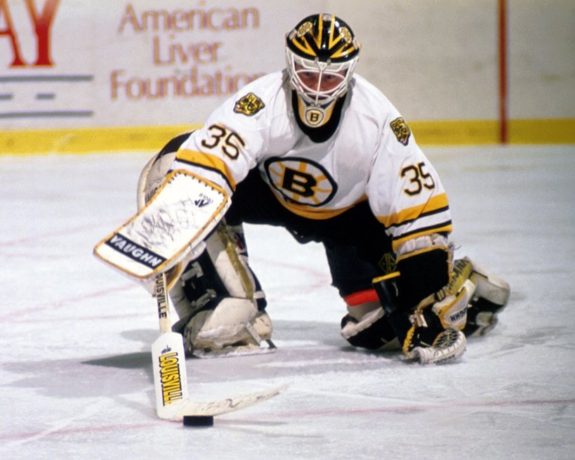
In Game 1, with former Oiler Andy Moog now in Boston’s net, they kept Edmonton to only two goals, a rare feat versus the 1980s Oilers, but the Bruins managed only one themselves. Game 2 saw Edmonton put four pucks behind the other Bruins’ goaltender, Rejean Lemelin, taking the series lead by two. A power outage ended the first edition of Game 3, which had been tied at the time, and the series returned to Edmonton. It would not make it back to Boston.
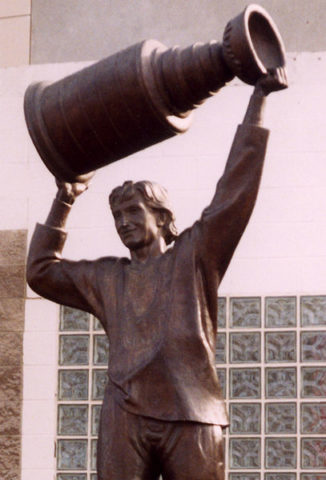
The Oilers won the do-over of Game 3 and then captured Game 4 as well. Gretzky lifted what would be the final Stanley Cup as an Oiler, and of his career. They had equaled the Cup win total of the New York Islanders in only their ninth year of NHL existence. And though none knew it, that was the beginning of the end of the dynasty years.
Great Without the Great One
With Gretzky traded to the Los Angeles Kings, virtually everyone believed the Oilers’ reign atop the league had ended. Certainly, their string of regular-season dominance and other-worldly scoring records had stopped, and it was Gretzky’s own Kings that knocked the Oilers out of the 1988-89 playoffs. But the team that had so dominated since it had entered the league still had some depth, starting with their new captain, Mark Messier.
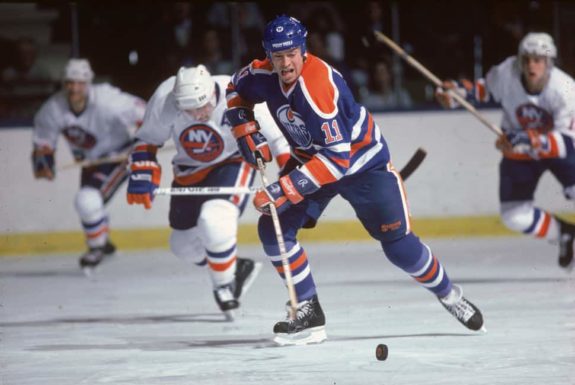
The 1990 playoffs started poorly for the team, as they fell behind the Winnipeg Jets three games to one in their Round 1 matchup. It may be that the Jets took their foot off the pedal, thinking the series was all but won, but whatever the reason, Edmonton came back. It took seven games, but they were on to the next round against the team that took their superstar, the Los Angeles Kings.
Gretzky instantly made L.A. a contender, as he would have done to any team. His Kings outlasted the defending champion Calgary Flames in their Round 1 matchup, ensuring there would be no repeat winner, and they were hoping to knock Edmonton out of the playoffs for the second straight season. Instead, they met a determined northern squad that not only beat but crushed them, scoring thirteen goals over the first two games of the series to L.A.’s one. Though the Kings gave the Oilers more trouble in the next two games, Edmonton swept through to the Conference Final.
Beating the Chicago Blackhawks in six games, the Oilers approached what was, at the time, very familiar territory. Not only would they be challenging for the Stanley Cup for the sixth time in eight years, but they’d also be facing a familiar foe in the Bruins. Though the Bruins were coached by Mike Milbury this time around, rather than Terry O’Reilly, the team’s roster was quite similar to the one the Oilers had beaten in 1988. The Oilers looked very different than the team that won that year. Gretzky was gone, and a young Bill Ranford received in the trade that had sent goaltender Andy Moog to Boston had taken the place of the legendary Grant Fuhr.
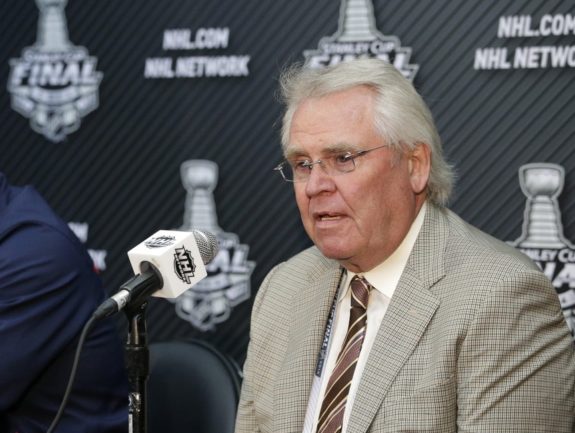
Edmonton once again conquered the Bruins, taking five games to capture the Cup Final series. Messier and teammate Craig Simpson, the prime return piece in the trade that saw Paul Coffey leave town, led the playoff scoring race, while Ranford won the Conn Smythe Trophy as playoff MVP. Over the coming years, the team would look drastically different. But for a brief moment in time, the dynasty lived on.
A Cinderella Run on Chris Pronger’s Shoulders
The 1990s and early 2000s were a dark time in Edmonton. Following their final Cup win, the remnants of their dynasty team were slowly dismantled. Some players went on to further championships elsewhere, while others were not so lucky. Either way, the product on the ice in northern Alberta was a shadow of what once had been. Other than surprising playoff series wins in 1997 and 1998, the team didn’t have the talent or budget to compete against the dominant clubs of that age. And it wouldn’t be until a locked out season leveled the scales and that hope would return to Edmonton.
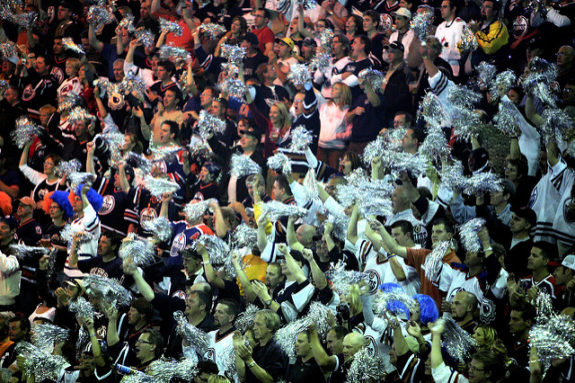
Teams like Edmonton, in small markets with very real caps on the money they spent, were finally given an even playing field when the NHL introduced its salary cap. Some of the big spenders were unprepared for the change, and no team lost a bigger piece than the St. Louis Blues. It’s fair to criticize longtime Oiler exec Kevin Lowe for many of his managerial actions, but acquiring Chris Pronger for peanuts (Eric Brewer, Doug Lynch and Jeff Woywitka) was inspired. The Oilers went from an also-ran to a contender overnight.
When the 2006 Oilers met the Detroit Red Wings in Round 1, they were going up against a team that hadn’t missed the playoffs since the Oilers had last won the Stanley Cup, with two generations of superstars playing side by side. While Steve Yzerman and Brendan Shanahan’s careers were arcing downwards, players like Henrik Zetterberg and Pavel Datsyuk looked more than ready to fill their shoes. Crafty strategy by Oilers’ head coach Craig MacTavish, and great goaltending from deadline acquisition Dwayne Roloson, shot Edmonton past their opponents in six games and into Round 2.
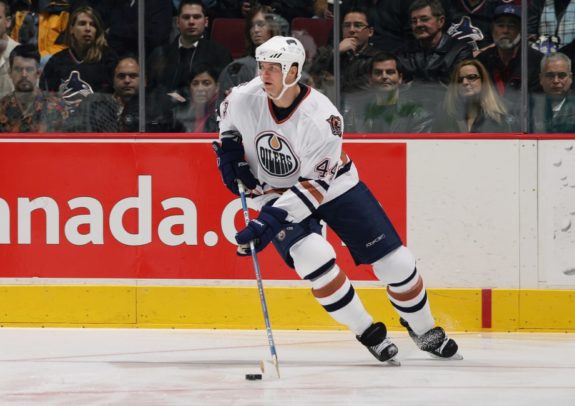
The San Jose Sharks and Anaheim Mighty Ducks (as known at the time) also couldn’t solve the Oilers, and those series ended in six and five games, respectively. Though in today’s game, the blindside hit would’ve meant a long suspension, Raffi Torres’ massive bodycheck on Milan Michalek helped turn around an 0-2 series, and the Oilers won eight of their next nine games, getting the chance to face the Carolina Hurricanes in the Stanley Cup Final.
Oilers Fall One Game Short
The last two competitors competing for the 2006 Stanley Cup were a testament to the parity a salary cap can create. Though Carolina had made the Cup Final three years prior, the Red Wings had obliterated them, and they missed the playoffs each of the next two seasons. They were back in the final round to face the Oilers and could even be labeled a slight favourite based on the two teams’ regular-season performance, capturing 112 standings points to Edmonton’s 95.
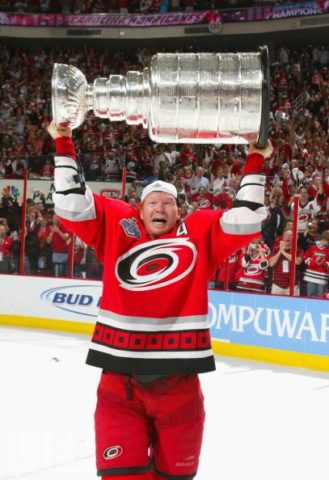
Game 1 mirrored the series as a whole, with Edmonton having moments of glory when victory seemed assured, only to be followed by utter disaster. Edmonton got out to an early lead and seemed to forget the disciplined strategy that had gotten them here. That and an injury to their MVP goaltender spelled certain doom, as the Hurricanes tied and then won the game on an all-time “oops” by backup goaltender Ty Conklin. Edmonton lost Game 1, and though they showed true grit, battling all the way to a seventh game, they never regained the series lead and ultimately lost the Cup.
Pronger would demand a trade that offseason, leaving town along with most of the key pieces of the Oilers’ Cup run. Those that stayed, like Ales Hemsky and playoff hero Fernando Pisani, would never see the playoffs in orange and blue uniforms again. Edmonton entered perhaps the most painful period in the team’s history, but out of all those years of suffering came the building blocks of today’s roster.
Can Today’s Oilers Win It All?
The Oilers have proven over their history that if you get into the playoffs, anything can happen. That doesn’t mean the Cinderella runs always end the way you want them to, but Edmonton won with and without Gretzky and came as close as a team can in 2006. This generation of Oilers is somewhere between the greatest teams of the ’80s and the awful ones of the ’90s and post-2006. With two bonafide superstars in their prime years and a better supporting cast than any time in recent memory, they seem ready to take the next step.
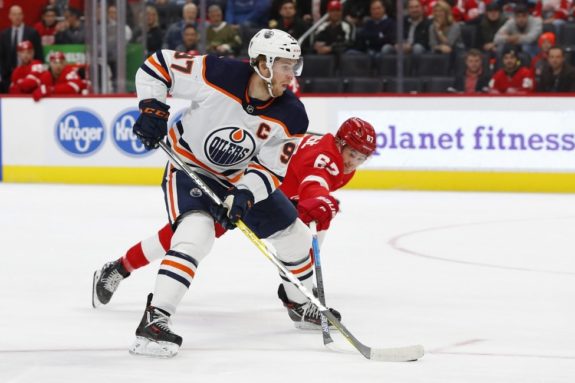
So much of winning a Stanley Cup is luck and timing. The 2006 team slid through at a time when Detroit was aging, and Anaheim and San Jose’s stars hadn’t fully developed, and that window just might be open today. The dominant teams of the recent past all have aging stars or salary cap issues. The Oilers will play in an all-Canadian division in the regular season where they’re one of the top three teams (on paper). A playoff berth means they have a chance, and that’s all you really need. Once you’re in, it’s just about talent, effort, and luck, and the Oilers are due for a little of that.